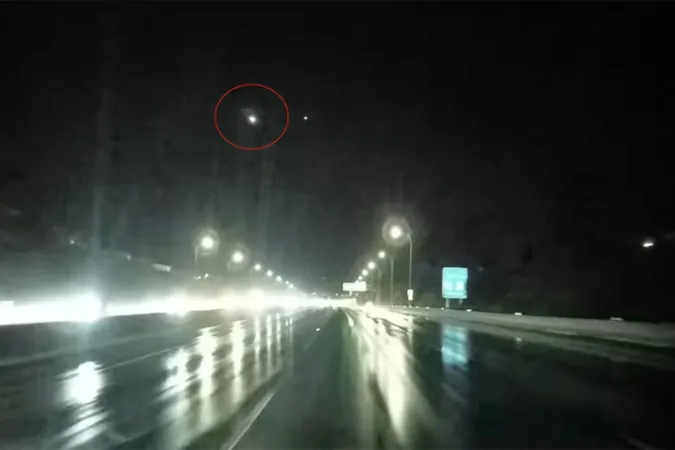
Stunning Flash Over Greater Victoria Unveiled as Spectacular Bolide Meteor!
2024-12-30
Author: Jacob
On the evening of December 28th, a dazzling flash lit up the sky over Vancouver Island, leaving countless residents of Greater Victoria and nearby areas in awe. Reports of this celestial event began flooding social media shortly after 6:20 p.m., as people scrambled to identify the source of the astonishing light.
Initial speculations ran rampant, with some claiming it might have been an explosion or a malfunctioning transformer, while others suggested a newly launched SpaceX shuttle or re-entering Starlink satellites could be the culprits. There were even theories swirling about a bus-sized asteroid making a brief appearance in Earth's orbit.
However, Canadian astronomer David Balam, a former researcher at the University of Victoria, swiftly clarified the situation. He confirmed that those who guessed it was a meteor were indeed correct. This stunning sighting, visible from locations as far as the Yakima Indian Reservation in Washington State to Nanaimo Airport, had been identified specifically as a bolide.
Balam provided fascinating insights about bolides, which are exceptionally bright fireballs that burst through the atmosphere. Derived from the Ancient Greek word *bolus*, meaning missile or javelin, bolides are unique in their intensity compared to standard meteors typically seen during seasonal showers. According to reports, this particular bolide was reportedly brighter than a full moon for over three seconds—a breathtaking sight for those lucky enough to witness it.
One of the key differences between bolides and artificial objects entering the atmosphere is their astonishing speed. While satellites can take about 60 seconds to cross the horizon, bolides disintegrate within seconds due to their incredible velocity, which can reach between 10 and 115 kilometers per second. “The longest bolide I’ve ever seen lasted about 10 seconds,” Balam noted.
Despite some online speculation, Balam emphasized that the odds of the meteor reaching the ground were minimal, estimating it likely burned up around 60 kilometers above the surface. "If something that size made it to the ground, it would be a truly spectacular event!” he added.
Though events like this aren’t extraordinary in the grand scheme of cosmic phenomena, Balam invites British Columbia residents to report any meteor sightings they may encounter. “We’re eager to understand what intersects with our biosphere at all times," he remarked. "From tiny dust grains to massive planetesimals, we want to know what’s flying through our atmosphere.”
For those wishing to contribute their observations, they can conveniently visit the American Meteor Society's website at amsmeteors.org to file a report. By doing so, they may answer their own intriguing questions about these celestial visitors. “If you see lights in the sky, head straight to AMS—they usually have the information before you even click submit on your report,” Balam advised.
In the meantime, residents of Greater Victoria will surely continue to chat about the mesmerizing bolide that lit up their night sky, creating a moment of wonder amidst the usual bustle of daily life. Who knows what other dazzling cosmic displays await in the future? Stay vigilant and keep your eyes on the sky!



 Brasil (PT)
Brasil (PT)
 Canada (EN)
Canada (EN)
 Chile (ES)
Chile (ES)
 Česko (CS)
Česko (CS)
 대한민국 (KO)
대한민국 (KO)
 España (ES)
España (ES)
 France (FR)
France (FR)
 Hong Kong (EN)
Hong Kong (EN)
 Italia (IT)
Italia (IT)
 日本 (JA)
日本 (JA)
 Magyarország (HU)
Magyarország (HU)
 Norge (NO)
Norge (NO)
 Polska (PL)
Polska (PL)
 Schweiz (DE)
Schweiz (DE)
 Singapore (EN)
Singapore (EN)
 Sverige (SV)
Sverige (SV)
 Suomi (FI)
Suomi (FI)
 Türkiye (TR)
Türkiye (TR)
 الإمارات العربية المتحدة (AR)
الإمارات العربية المتحدة (AR)